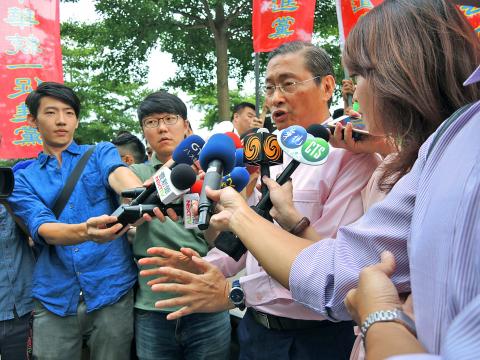Dressed as Japanese Imperial Army soldiers, members of the China Unification Promotion Party yesterday demonstrated outside Democratic Progressive Party (DPP) headquarters in Taipei, accusing the DPP of “brainwashing” students with pro-Japan curricula.
“We want to thank the DPP for educating the children in Taiwan to love our Empire of Japan. This is something that our own Japanese kids would not do, and something we could not force the Taiwanese to do in our 50 years of Japanizing education,” a man dressed up as a Japanese Imperial Army commander said through a loudspeaker, with a Japanese accent. “Therefore, we are here to present our certificate of gratitude to the DPP today.”
Holding a “certificate of gratitude,” the protesters declared that they would sing a Japanese military song before entering the building, but what they sang instead was the Japanese children’s song Momotaro-san, or “The Peach Boy,” eliciting laughter from both members of the media and DPP staff.

Photo: CNA
However, when the DPP declined to accept the certificate, the protesters attempted to force their way in, and briefly clashed with the police.
“What you are doing now is in violation of the Assembly and Parade Act (集會遊行法). If you try to force your way into the building again, we will arrest you,” Zhongzheng First Precinct Chief Chang Chi-wen (張奇文) said through a loudspeaker.
Former gang leader and China Unification Promotion Party chairman Chang An-le (張安樂) — better known by his Bamboo Union nickname “White Wolf” — later appeared to talk to the media about the demonstration.
“The protesters dressed up in Japanese Imperial Army uniforms to mock the education under former president Lee Teng-hui (李登輝) and the DPP, which ‘poisoned’ the students with pro-Japan curricula,” Chang said. “And this is why the curriculum guidelines must be changed.”

Taiwanese can file complaints with the Tourism Administration to report travel agencies if their activities caused termination of a person’s citizenship, Mainland Affairs Council Minister Chiu Chui-cheng (邱垂正) said yesterday, after a podcaster highlighted a case in which a person’s citizenship was canceled for receiving a single-use Chinese passport to enter Russia. The council is aware of incidents in which people who signed up through Chinese travel agencies for tours of Russia were told they could obtain Russian visas and fast-track border clearance, Chiu told reporters on the sidelines of an event in Taipei. However, the travel agencies actually applied

Japanese footwear brand Onitsuka Tiger today issued a public apology and said it has suspended an employee amid allegations that the staff member discriminated against a Vietnamese customer at its Taipei 101 store. Posting on the social media platform Threads yesterday, a user said that an employee at the store said that “those shoes are very expensive” when her friend, who is a migrant worker from Vietnam, asked for assistance. The employee then ignored her until she asked again, to which she replied: "We don't have a size 37." The post had amassed nearly 26,000 likes and 916 comments as of this

New measures aimed at making Taiwan more attractive to foreign professionals came into effect this month, the National Development Council said yesterday. Among the changes, international students at Taiwanese universities would be able to work in Taiwan without a work permit in the two years after they graduate, explainer materials provided by the council said. In addition, foreign nationals who graduated from one of the world’s top 200 universities within the past five years can also apply for a two-year open work permit. Previously, those graduates would have needed to apply for a work permit using point-based criteria or have a Taiwanese company

US President Donald Trump said "it’s up to" Chinese President Xi Jinping (習近平) what China does on Taiwan, but that he would be "very unhappy" with a change in the "status quo," the New York Times said in an interview published yesterday. Xi "considers it to be a part of China, and that’s up to him what he’s going to be doing," Trump told the newspaper on Wednesday. "But I’ve expressed to him that I would be very unhappy if he did that, and I don’t think he’ll do that," he added. "I hope he doesn’t do that." Trump made the comments in